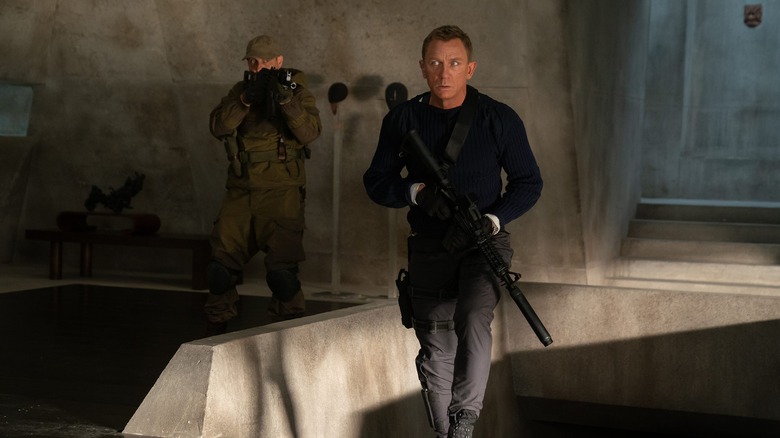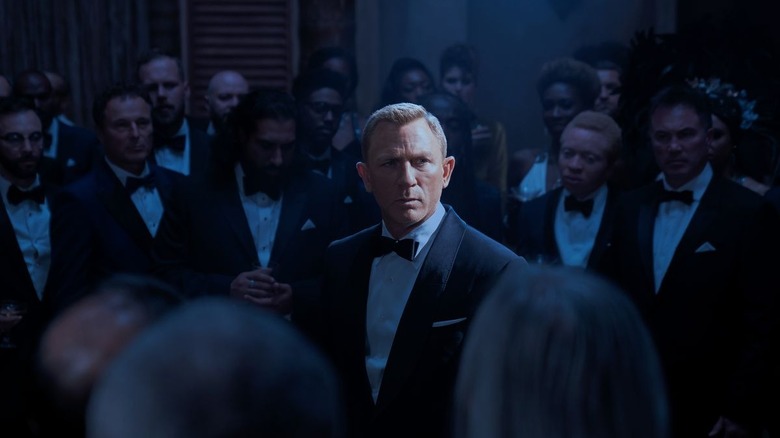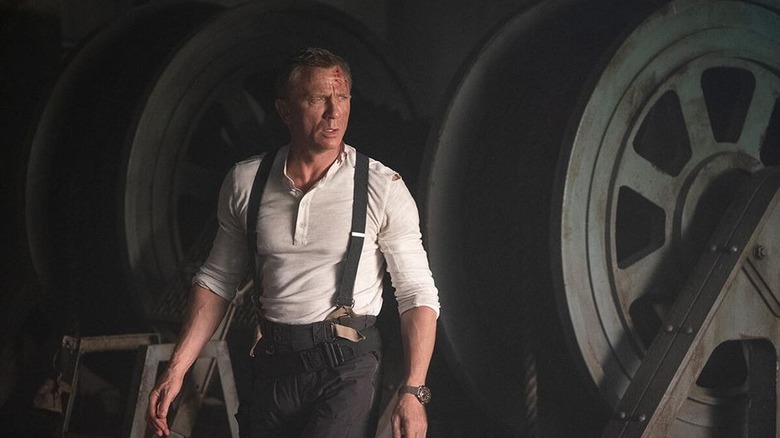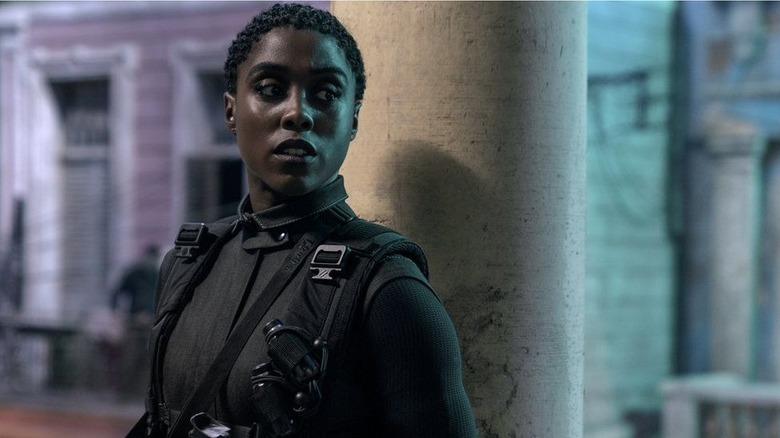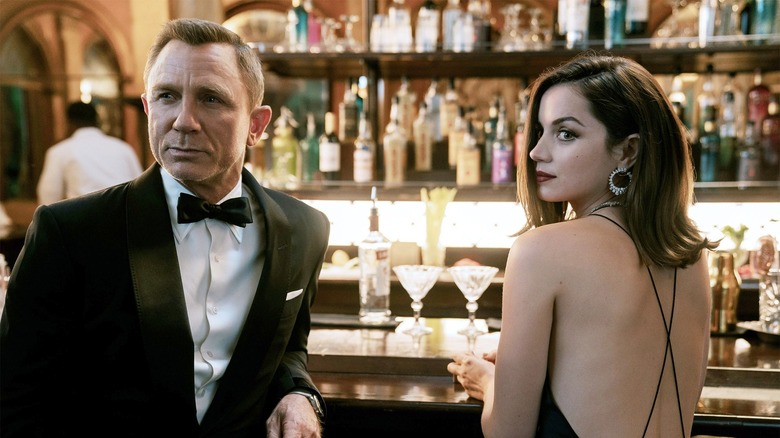No Time To Die Producers Barbara Broccoli And Michael G. Wilson On Making The Biggest Bond Movie To Date [Interview]
"No Time to Die" reaches new epic heights for the James Bond franchise. Daniel Craig and audiences are being given a whopper of a farewell in the final film of Craig's run as 007. Producers Barbara Broccoli and Michael G. Wilson felt it was only right to go out big time with Cary Joji Fukunaga's Bond picture. The scale is almost laughably big and even calls to mind, in a fun way, the Roger Moore era.
"We wanted to honor all the people that really started this franchise," Broccoli told /Film in an interview ahead of the release of "No Time to Die." She added, "It really is a celebration of everything that's come before."
The scale, the jokes, and the emotions are turned up in "No Time to Die," which for the longtime Bond producers, not only honors Craig's run of films, but the history of the 59-year-old franchise. That's always the goal for Broccoli and Wilson. Recently, the Bond producers told us about making the latest addition to the franchise, the legacy of "On Her Majesty's Service," and why they remain proud of "Quantum of Solace."
"Knowing that it was Daniel's last one was a game-changer for us."
This is without question the biggest Bond movie to date.
Broccoli: Yes it is, it's definitely the most ambitious in several respects.
What made you decide to go this big?
Broccoli: Knowing that it was Daniel's last one was a game-changer for us. We really did want to put the character through its paces. We wanted an epic conclusion, which I think we've delivered.
Your first American director, too. Was that always a strict rule for you both or were you always open to it?
Broccoli: I think we've always wanted to have British or Commonwealth directors because we felt they would understand the sensibilities of Bond and the humor and the world and everything. But when we had to find someone for this film, Cary, who I'd met before and I've always been a huge fan of his work, he came to mind, he became available. The timing seemed right. And you know, he was a man of the world. He's very international. He's well traveled. He speaks multiple languages. He's fearless. And he's a great filmmaker. So he seemed like the obvious choice at the time. He certainly has delivered a great Bond film.
You're both very candid in "Being James Bond," especially about how exhausting these movies are, not only for Daniel Craig, but for yourselves.
Wilson: Yeah. I mean, we were on a long time and it does take our attention and emotions, but there are directors and actors that pour their heart and soul into this thing. Everyone on the crew works so hard. They're so committed to Bond. They just love working on the films, so it's hardly just us that can be emotional.
Broccoli: No, it's a tremendous privilege to work on these movies, the scale of movie with the kind of people we get to work with. I mean, it's a dream come true.
"It really is a celebration of everything that's come before."
What's a particularly tough day look like for the both of you on a Bond movie?
Broccoli: The major ones are always injuries. That's the worst thing. That's the thing you dread more than anything. And when you have an actor like Daniel Craig who throws himself into every situation, gives 100%, he's had several injuries over the course of the films and he is so remarkable. I mean he is like a top athlete, but most top athletes only have to perform sporadically. With him, he has to perform for six months, five-six days a week.
Wilson: I remember on "Spectre" when he had a very severe leg injury, two injuries in his leg. He didn't want to stop shooting. We were about to break for Easter for a long weekend and we were shooting that whole opening sequence in "Spectre" and he was doing it and he was in tremendous pain. I just sat there with the director, Sam Mendes, and I was literally crying at the monitor because I couldn't believe what he was doing, you know? And then he took the break and he went and he had the first surgery, which helped a little bit. And then after the film ended, he had the full ACL surgery. So, I mean, those are things that's very hard, when you see someone going through something like that. That's difficult.
Barbara, was it truly as simple as telling Daniel Craig that, no, "Spectre" is not your last Bond movie?
Broccoli: [Laughs] Well, that was a bit of a challenge, yeah. I let him think he was going to leave for a couple months. And then once he got some rest, just knocked on the door and said, "Come on, let's talk. This can't be your last movie. I mean, there's still another chapter to go." So fortunately, Michael and I convinced him that there was more to tell in the story and this movie is the epic conclusion of that.
Did you two feel like you were looking back at the past of the franchise more with "No Time to Die" than the previous films? A few scenes show some love for the Roger Moore era, and Cary has said he's a big "View to Kill" fan.
Wilson: Oh, that's a lot of things that harken back to the past. "On Her Majesty's Secret Service," [the theme song] "We Have All the Time in the World." Some of the music themes from "Casino Royale" comes back. So there are those triggers too. And also, there are all through it, some elements from Bond history. We're never far from that, the Aston Martin and we had more gadgets this time than usual in the Daniel films. So we have been harking back to a lot of the old ones.
Broccoli: I think also we wanted to honor all the people that really started this franchise, whether it was starting with Cubby [Broccoli] and Terence Young and Ken Adam and John Barry. I think that there are little touches of all of them within this film. It really is a celebration of everything that's come before.
"We put a lot into them, so they're very close to our hearts, all of them really."
What do you both think about "On Her Majesty's Secret Service" legacy in the franchise? It's become very beloved and influential for a lot of filmmakers.
Broccoli: Absolutely.
Wilson: People think it's the best story from the Bond series. And it was, again, a highly emotional one. Bond gets married, thinks about leaving the service and all that, which is something that we brought into "Casino Royale" and we brought to "Spectre," into this film and all those ideas, the ambivalence that comes with the job.
Which of the Bond films, maybe more than others, are particularly meaningful for you both?
Broccoli: I think "Goldeneye" was a big one for us because that was the first one that Michael and I did without our dad. So that was a tough one. And we were rebooting Bond then with Pierce Brosnan. It was at a time when the wall had come down and everyone was saying that the world was a safe place and no one needed James Bond. I think that was a tough one. And then, again, with "Casino Royale" and redefining Bond for the 21st century with a book that had been the thing that my father had wanted to make, that had eluded him. And now this film. I think each one of these films are very special. We put a lot into them, so they're very close to our hearts, all of them really.
There's a great line in this movie about how women react to Bond. "It's 50/50," someone says. In both of your experience, is that an accurate figure for how women respond to him?
Broccoli: [Laughs] Yes. I think he's one of those people that people are going to respond one way or another in a pretty polarized way. But he's become part of the culture. I think people really enjoy the legend of Bond.
You can definitely hear Phoebe Waller-Bridge's voice in this movie. How did her work impact the story?
Broccoli: She's amazing. She's such a terrific writer. And she came on and worked on the script, the storyline, the characters, the humor, and everything. She was just a tremendous addition to the writing team. They all made a tremendous contribution, but yeah, the British humor is something that I think everyone appreciates around the world.
"I think it's part of the whole evolution of Bond."
When you first cast Daniel Craig, you probably both had expectations of where you all would take this character. How does his run as Bond compare to what you originally had in mind?
Wilson: Well, I think you always expect — I expect him to be a great Bond and that's what we had in mind, but he turned out much better than I ever imagined. He devoted himself to it. In preparing for the role, he completely changed his body, physically speaking. And when he's making the film, he's totally committed to it. He works all day and then he goes and he looks like a monkey, he exercises and prepares for the next day if it's an action sequence or with the stunt people. And then gets to bed early and gets back to work. Always prepared, always ready, devoting himself completely to the character and working with the director to make sure he gets his say in how the character will react.
And as time went on, he got more and more experience with the Bond character, more and more instinctive with the Bond character so that he would instinctively know how the character would react in situations and how the character would speak. And so, he just devoted himself so much to the role that it was fantastic. And on top of that, he's a great person. He's a great leader of the cast and he's also a wonderful person to work with and charming and just delightful to have on the set. So it's just what everyone would hope for, especially if you're a producer.
You both talk about the problems with "Quantum of Solace" in "Being James Bond." It's a very lean revenge movie, which is not what you expect from Bond. Despite the problems it faced, are you still proud of it?
Broccoli: I'm really proud of the movie. I think it's part of the whole evolution of Bond. And I think after "Casino Royale," when he shuts down emotionally, the next step was going out for revenge. I think the story of that film is that revenge is an empty challenge. You don't get any benefit from revenge. So I think it's important in the whole history of the evolution of this character. I'm very proud of it for sure.
"No Time to Die" hits theaters October 8, 2021.
